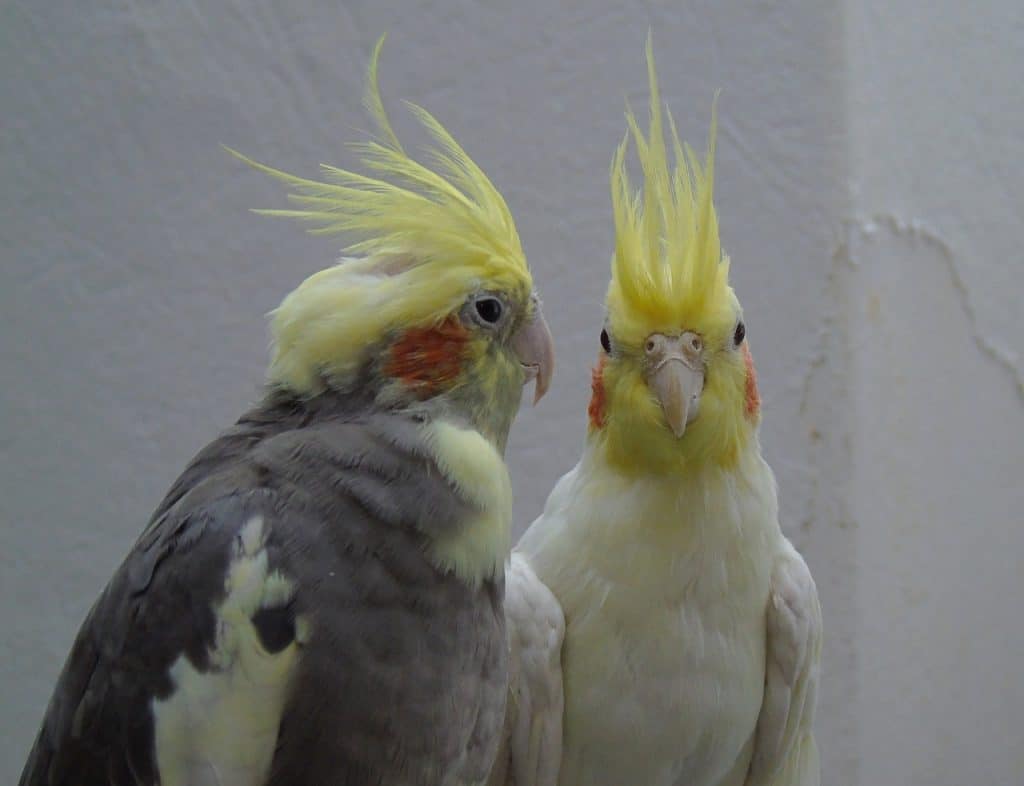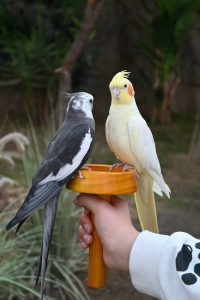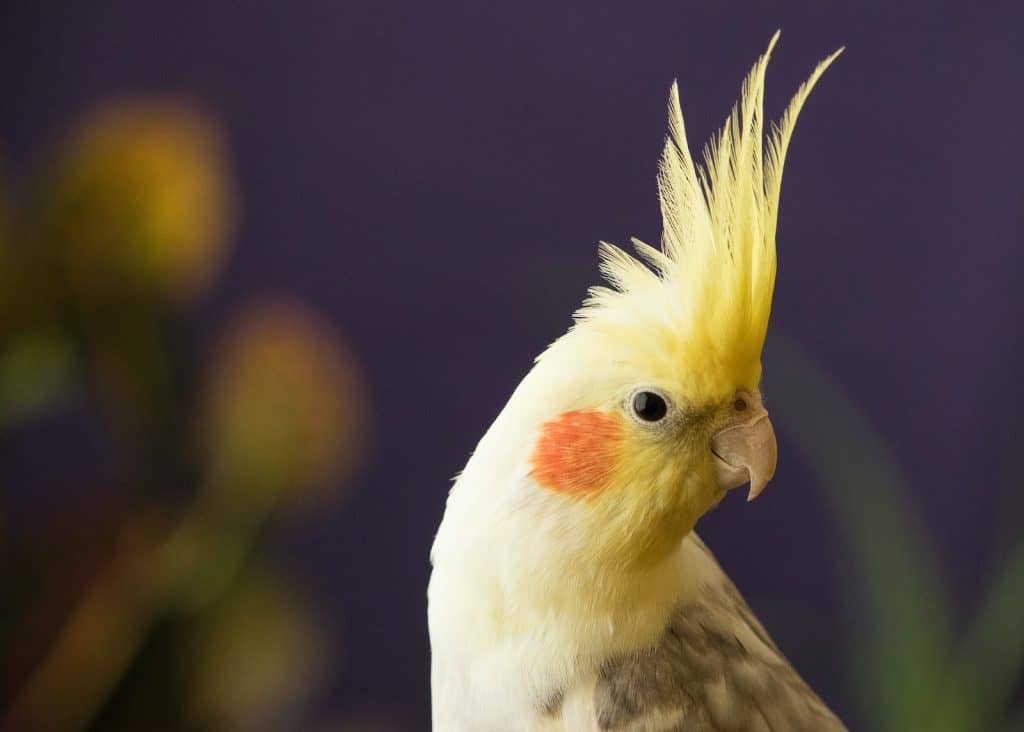If you’ve ever found yourself asking, “Do cockatiels cry?” you’re not alone. This is a common question, stemming from their varied and expressive vocalizations. Cockatiels—particularly male cockatiels—are known for their ability to mimic sounds, resulting in a wide array of noises from whistling to seemingly human speech. Although it might sound like your feathered friend is weeping, that’s not quite the case.
In fact, what might come across as a cockatiel “crying” is actually a part of their natural language and way to express different needs or moods. From the gentle beak grinding of a content, happy cockatiel to loud flock calls when they’re feeling alone, these birds use sound for communication. This doesn’t mean they experience sadness in the same way humans do, but rather they are signaling for attention, ensuring their presence is known, or even expressing discomfort or distress.
Now, if you’re dealing with a cockatiel screaming incessantly, it’s essential to understand why. Various triggers, including environmental changes, loneliness, or health issues could be the root cause—sometimes, even moving the cockatiel’s cage to a more quiet room can help. Furthermore, how you respond to your bird’s calls can significantly influence their behavior. Unintentionally reinforcing a cockatiel’s scream by rushing towards them each time it happens could lead to increased noise as the bird recognizes this as a successful contact call.
Understanding Cockatiel Behaviors

As a cockatiel owner, you may wonder: “Do cockatiels cry?” It’s a common question, and the answer lies in understanding the complex language of these fascinating birds.
Cockatiels are expressive birds. They communicate a variety of moods and needs through different sounds, including the commonly misinterpreted ‘cockatiel crying’ sound. What appears to be crying is usually the cockatiel making a contact call. This behaviour is often observed in wild cockatiels, who use contact calls to maintain connection with their flock even over long distances.
Let’s discuss some common behaviors that you may observe in your cockatiel:
- Screaming: Cockatiels scream when they’re agitated or want your attention. Male cockatiels can be louder than females, so don’t be surprised if your bird intensifies this behavior for seemingly no apparent reason. It’s their means of expressing dissatisfaction, or it could also be a cry for help, indicating potential health issues.
- Flock call: If your cockatiel is producing a loud, repetitive noise (almost like a whistle), they may be making a flock call. This behavior is common in both wild cockatiels and domestic pets, as it’s a means for them to connect with members of their flock. A domestic cockatiel may see human family members, or other birds in the household, as their flock.
- Beak grinding: A healthy, content, and happy cockatiel may produce a soothing, grinding sound using their beak. Most often, this behavior is observed just before they fall asleep, indicating comfort and relaxation.
To better understand these behaviors and communicate with your pet, you should learn to distinguish between these different types of cockatiel sounds:
- Contact Call: Sounds like a repetitive whistle or squawk. It’s a way for cockatiels to keep in touch with their flock. This behaviour is often observed in both male and female cockatiels.
- Screaming: Distinct and usually quite loud, this sound may indicate that your cockatiel is stressed or scared. It’s a warning sound to alert the flock of potential danger. Some cockatiels might also scream out of boredom or for demanding attention.
- Singing: Especially observed in male cockatiels, singing or talking can indicate a cheerful and social bird. It’s a means of expressing joy and for establishing communication with their human friends.
- STURDY CONSTRUCTION - Made of a premium low-carbon steel frame with a black coating that makes this bird cage sturdy, durable, even against playful birds; Guaranteed to resist wear and rust
- PORTABLE AND LIGHTWEIGHT - This bird cage is just 14 lbs., which is lightweight and easy for you to carry for short-term traveling; The compact design allows you to store it with less used space; Product Dimensions: 18.9" (L) 15" (W) 18.7" - 25.6" (H)
- HIGH SAFETY - The spacing between the longitudinal bars at the bottom of the cage is 0.6", so birds can safely jump and play without injury; Ensure the safety of your lovely friends
- 2 IN 1 DESIGN - Equipped with a wooden perch on the top of this bird cage, your birds can stay there and play with each other; And you can lift this bird cage with the wooden perch
- EASY TO ASSEMBLE - The integrated design allows you to easily assemble it within 30 minutes with just a few small tools; It also comes with a colorful rope for the entertainment of birds
Deciphering Cockatiel Vocalizations

Understanding your feathered friend’s range of cockatiel sounds can be a puzzle. The question you might be asking is: do cockatiels cry? The answer isn’t straightforward. Unlike humans, birds, and cockatiels in particular, express their emotions through a variety of noises and sounds. Here’s how you decipher their unique language.
Male cockatiels are known for their boisterous and lively sounds, while female cockatiels tend to have a softer, more melodic repertoire. Interestingly, baby cockatiels experiment with a mix of sounds before settling into their own unique style as they mature, while wild cockatiels usually use loud, sharp calls to communicate with their flock.
Take note when your cockatiel makes a flock call. Flock calls are typical communication among birds. It’s the equivalent of asking “Where are you?” They’re trying to locate their human friends or other cockatiels in the house.
The sudden cockatiel scream or repeated screaming could seem like your bird is in distress. However, don’t panic just yet – cockatiel screaming doesn’t always signal trouble. Often they’re just seeking your attention or reacting to a perceived threat, like a cat, a loud noise, or a new toy in their cockatiel’s cage.
Listening to cockatiel sounds may be perplexing initially, but over time you’ll begin to determine different meanings. Incessant screaming, for instance, indicates that your pet wants attention or isn’t happy with something in their surroundings. If you hear a high-pitched flock call or see a flurry of feathers around their cage, they’re likely upset. Another rare but clearly detectable sound is beak grinding, which means your cockatiel is content and ready to fall asleep.
In the wild, a cockatiel’s scream is a warning for potential danger. However, your pet cockatiel doesn’t have this need while living with human friends and family members in your home.
What’s essential is to pay attention to their behavior in addition to the noises they make. Feather plucking or displaying aggression can be signs of stress or health issues. If the shouting becomes incessant without an apparent reason, it might be best to consult with your vet about your bird’s well-being.
Remember the golden rule: avoid rewarding bad behavior. If your cockatiel screams for attention and you respond every time, they’ll learn that screaming equals attention. Instead, learn to interpret their different calls, noises, and signals. By bettering your understanding of your cockatiel’s unique language, you can ensure a happier and healthier relationship with your feathered friend.
Cockatiels and Emotional Responses

Although crying, as we define it, isn’t a common trait among cockatiels or birds in general, there’s no denying they display a range of emotional responses. Their behavior, such as beak grinding, feather plucking, or even screaming incessantly, can hint at their state of mind and emotion.
Emotion in cockatiels is nuanced. Most cockatiels express themselves through a symphony of sounds that, to the untrained ear, might seem like senseless noise. However, these sounds can include everything from a content, quiet whistle to a deafening cockatiel scream. Observing and understanding these sounds is the first step to decode your feathered friend’s emotional state.
Surely, cockatiels scream louder than most other birds, and there are reasons for it. When your cockatiel is screaming, often, it’s nothing more than an attention-seeking tactic or a flock call, a form of communication between birds in the wild.
Interestingly, male cockatiels are often louder than female cockatiels, especially during their mating calls. Distinguishing the types of cockatiel screams and understanding their different meanings can help you respond kindly to your little buddy’s emotional needs.
A happy cockatiel often makes sounds similar to their wild counterparts, the wild cockatiels. These cockatiel sounds include whistles, chirps, or even mimicry of human speech. If your bird is repeating these “happy sounds,” they are likely content, healthy, and well-adjusted in their cockatiel’s cage or room.
But what if your cockatiel is screaming incessantly? This behavior could indicate your cockatiel is upset or anxious for some apparent reason. They scream more often in cases of boredom, loneliness, or even cage aggression.
If you notice changes in the behavior of your bird, whether it’s an increase in cockatiel screaming or unusual noises, it’s important to look for potential distress signals. Keep an eye out for physiological changes and alterations in food habits, as these signs might hint at potential health issues.
Learning to read your feathered friend’s emotions is an ongoing process. As you slowly understand your cockatiel’s unique language of noise and sounds, you’ll find a new depth in your relationship with your pet. But always remember, every cockatiel is unique, and learning their language takes time, patience, and most crucially, love.
Wrapping Up: Do Cockatiels Actually Cry?
So, the answer to the burning question “Do cockatiels cry?” is a little more complex than a simple yes or no. Cockatiels, like most birds, don’t express their feelings in the same way humans or other mammals might. While you won’t see a cockatiel shedding tears if it’s upset, the variation in the types of noises cockatiels make can certainly suggest an array of bird emotions.
Cockatiels, especially male cockatiels, are known for their vocal capabilities. From the soft whistle of a happy cockatiel to the piercing scream of a frightened or upset bird, cockatiels use sound to communicate with their human and feathered friends. Various forms of screaming, including a certain kind of cockatiel screaming you might know as a ‘flock call’, are common ways cockatiels get their message across.
Of course, not all loud noises from your cockatiel should be a reason for alarm. They could simply be sounds of joy, especially when new toys or favorite foods are in sight. But constant screaming, especially cockatiel screaming that doesn’t stop, could be a sign of a problem.
That wraps up the question of do cockatiels cry. While these birds don’t shed tears like humans do, they have unique ways of expressing themselves. Ultimately, the key to understanding what your cockatiel is communicating lies in attentive observation and care. Be patient when decoding the messages from your feathery friend, be it a loud call or a happy whistle, as your bird will appreciate your understanding and effort.
- Do Cockatiel Bites Hurt Are They Dangerous
- Do Cockatiels Cry
- Do Cockatiels Dance
- Do Cockatiels Eat Insects
- Do Cockatiels Get Lonely
- Do Cockatiels Like Music
- Do Cockatiels Like The Dark
- Do Cockatiels Like To Cuddle
- Do Cockatiels Mate For Life
- Do Cockatiels Need A Companion
- Do Cockatiels Need Cuttlebone
- Do Cockatiels Need Darkness To Sleep
- Do Cockatiels Need Grit
- Do Cockatiels Recognize Their Owners
- Do Cockatiels Sneeze
- Do Conures And Cockatiels Get Along
- Do Birds Know Their Names




